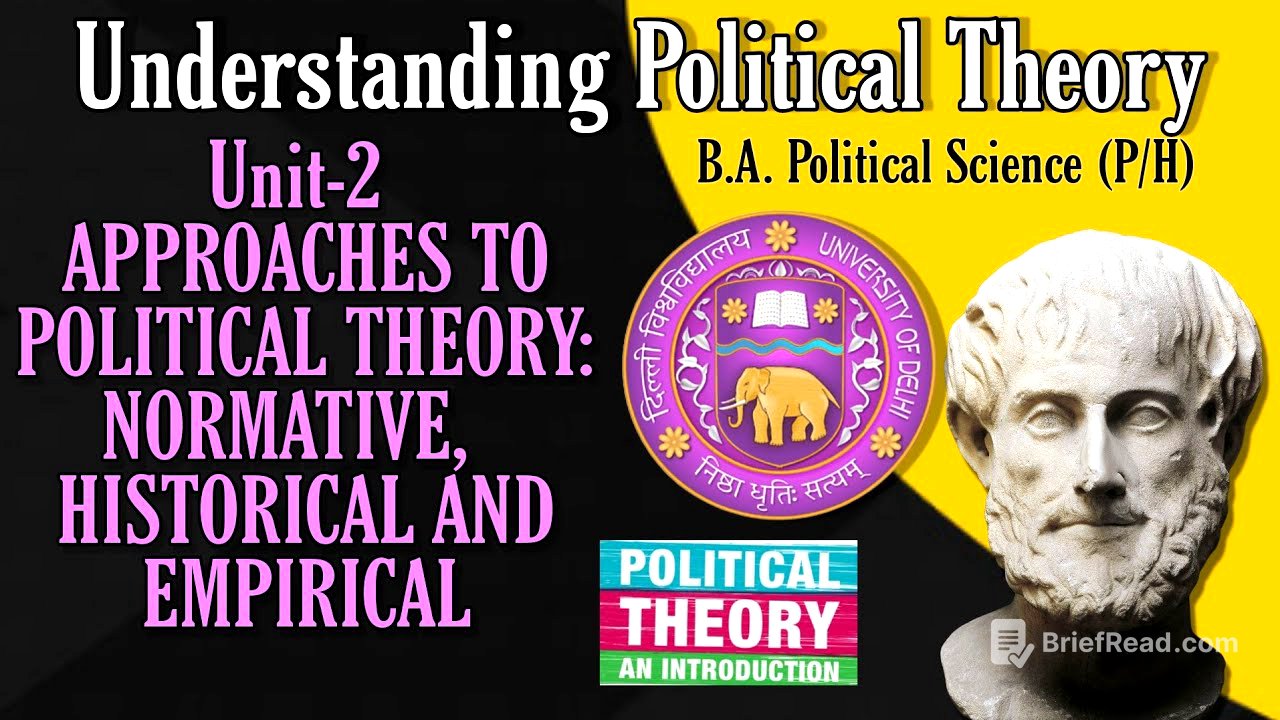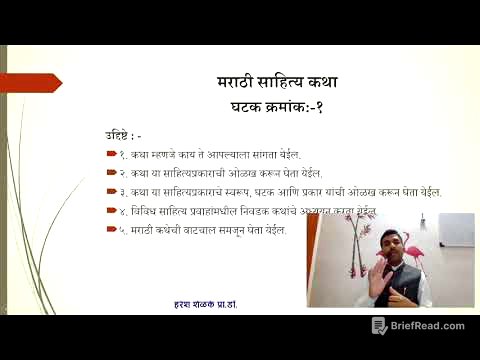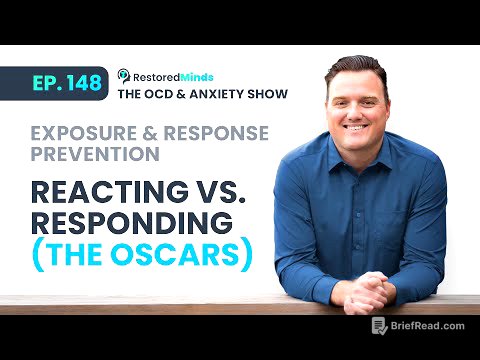TLDR;
This video provides an overview of political theory, its relationship to political science and political philosophy, and discusses various approaches to studying it, including normative, historical, and empirical approaches. It also touches on key concepts, criticisms, and the importance of understanding the historical context of political theories.
- Political theory is a branch of political science that examines political phenomena, processes, and institutions through philosophical and ethical lenses.
- Normative, historical, and empirical approaches offer different perspectives on studying political theory, each with its strengths and weaknesses.
- Understanding the historical context is crucial for interpreting political theories and their relevance to contemporary issues.
Introduction [0:02]
The video introduces the topic of understanding politics and political theory, emphasizing its importance for political science students. The channel aims to explain concepts in detail, using direct readings from books to provide a basic understanding. The structure of the unit will include learning objectives, key concepts, and a summary. The goal is to enable viewers to differentiate between modern and traditional approaches and comprehend their usefulness.
Political Science, Theory, and Philosophy [0:46]
The discussion begins by defining political science as an old discipline with political philosophy as its most important branch, originating in ancient Greece. Aristotle is identified as the father of political science, which is considered a "master science" due to its interdisciplinary nature. Political science encompasses political philosophy, comparative politics, and other subfields. The importance of rational decision-making based on facts and figures, rather than emotions, is highlighted. Philosophy had a great influence on political science, particularly in ancient times, with religious scriptures and superstitions playing a significant role. Machiavelli is mentioned as the framer of statecraft, giving autonomy to politics from ethics and religion.
Political Theory, Philosophy, and Science Defined [8:22]
Political theory, political philosophy, and political science are interconnected but distinct. Political theory is a scientific discipline within political science that studies political and social order, while political philosophy examines concepts through the lens of ethics and moral values. Political science analyzes political establishments, institutions, and governments in an impartial, value-free manner. Behaviorism, a new form of political analysis, emerged after World War II, marking a shift from the dominance of history and values. Political theory and political philosophy share similarities but have identifiable differences, with both being core disciplines of political science.
Political Theory in Detail [12:57]
Political theory was introduced as an independent subject because it was previously associated with political science and philosophy. Intellectuals and philosophers conduct research in this domain. Political theory is the most accurate term for referring to intellectual traditions that recognize the capacity to act on immediate practical concerns and critically analyze society. It involves studying the concept of a word, its origin, and its various concepts. Political science observes words and their origins, while theory involves research. Political theory is utilized interchangeably with political science and plays an important role in providing credible generalizations and rules of politics and political behavior.
Political Theory and Ideal Political Order [16:25]
Political theory deals with political phenomena, processes, institutions, and tangible political behavior, using philosophical and ethical benchmarks. It researches institutions, their origins, and their impact. Political theory explores freedom of thought and shares ideas about the best political order, addressing the ideal form of life within a larger community. It tells us what should be done and how.
Political Philosophy Explained [18:30]
Political philosophy involves philosophical reflection on human reach, political institutions, and social practices, based on ethics and moral values. It guides what to do and what not to do, focusing on how things should be. Philosophers propose concepts around which individuals frame their basic principles of life. Political philosophy aims to improve a person's life and guide them toward truth. Plato is considered the father of political philosophy, while contemporary political philosophers include Gandhi, Bindu Tagore, Ambedkar, and John Rawls.
Political Theory vs. Political Philosophy [22:02]
Political philosophy deals with what should be, while political theory explains what is and what should be. Political philosophy asks what a good state is, while political theory tries to answer what a state is. The distinction between political theory and political philosophy was made around the 19th century. Traditionalists viewed them as the same, but modern political scientists differentiate them, guided by empiricism. Political theory contains determinants and power, while state philosophy lacks independent existence.
Key Differences and Focus [27:17]
Political theory is rational and objective, treating everyone equally, while political philosophy is based on emotions and values. Political philosophy plays a beneficial role in political theory, which is confined to established beliefs. Political philosophy inspires, while political theory ends mystery and delusion. The fundamental focus of political philosophy is politics, with unique positions detailed in political theory. The analysis helps differentiate between political philosophy and political theory on three grounds: objectives, subject matter, and validity.
Approaches to Political Theory [35:16]
The video transitions to discussing approaches to political theory, distinguishing between "method" and "approach." Method is a general term for a particular way of doing something, while approach is a broader term with no definite definition. Laker defines approach as consisting of criteria for selecting problems and questions, selecting data, and governing the inclusion and exclusion of questions and data. The discussion then differentiates between traditional and contemporary approaches, with traditional approaches being dominant until World War II and contemporary approaches emerging afterward.
Normative Approach [41:01]
The normative approach to political theory stems from moral philosophy and focuses on what "ought" to be, rather than what "is." It emphasizes moral choices and can be traced back to ancient Greece and Hindu philosophy. This approach illustrates the relationship between individuals and institutions, serving as a litmus test for the legitimacy of existing political institutions. The method involves internal consistency, moral arguments, and concepts borrowed from social anthropology and history.
Normative Theory: State and Justice [48:53]
Normative political theory addresses the state and the question of distributive justice. It questions the justification for political institutions, their nature, and when obedience or disobedience to the state is justified. In terms of distributive justice, it raises questions about freedom and equality, exploring the relative importance of substantive equity and the autonomy of individual needs.
Major Positions in Normative Politics [50:58]
The major positions in normative politics include utilitarianism, logical liberalism, and communitarianism. Utilitarianism, developed by Jeremy Bentham, claims that human beings maximize pleasure and minimize suffering. Logical liberalism, debated in the 1970s, focuses on morality and judging the worth of human conduct. Communitarianism critiques the individual self, arguing that individuals are tied to the social order and cannot be separated from society.
Criticisms of Normative Theory [1:00:14]
Criticisms of normative theory come from logical positivism, moral relativism, and determinism. Logical positivism, influenced by Ludwig Wittgenstein, questions the meaning of language and its capacity to communicate. Moral relativism argues that morality relates to good values and that universal common values cannot be considered right for all. Determinism suggests that individuals are incapable of being autonomous agents and are subject to moral preconditions.
Historical Approach [1:08:50]
The historical approach examines political theory within its historical context, emphasizing that today's politics has roots in the past. Scholars like George Sabine believe politics is linked to the historical context of the order. This approach involves understanding political thought through history and settling the chronology of political events.
Historical Approach: Key Considerations [1:15:58]
When using the historical approach, it's crucial to maintain a critical attitude, evaluate historical events, and consider whose voices are included or excluded. Allen Ball notes that political history often focuses on great men and great events, rather than providing a comprehensive account of total political activity. The subaltern studies movement, with figures like Ranjit Guha, aims to document the history of marginalized sections of people.
George Sabine and Historical Context [1:21:07]
George Sabine's work is a prime example of the historical approach, emphasizing the need to include prominent political philosophers and see everything in relation to the subject. He believed that political problems and their solutions could be found by considering the validity of political beliefs through history. Sabine also noted that political theories are made up of factual, casual, and valuable elements.
Criticisms and Enduring Significance [1:32:21]
The historical approach faces criticism due to the two faces of history: factual documentation and phenomenal interpretation. Accumulating evidence requires a critical mind and proper analysis. Despite these criticisms, strong political theories have everlasting significance, and political philosophy is universal because it has legitimacy.
Empirical Approach [1:44:13]
The empirical approach is related to science and emphasizes data and research. Its history can be traced back to Aristotle and Machiavelli. This approach tests hypotheses through observation and experiment, rejecting theories based on value judgments. John Locke advocated that the human brain is a "tabula rasa" on which information is stored through sense data.
Facts vs. Values and Political Reality [1:51:12]
The empirical approach distinguishes between facts, which are supported by experience, observations, and experiments, and values, which are beliefs and opinions that cannot be trusted. It aims for an unbiased and impartial analysis of political reality. Unlike the normative approach, it does not make judgments or offer recommendations but describes, analyzes, and explains phenomena based on facts.
Empirical Approach and Its Critics [1:59:44]
The empirical approach has been criticized for its reliance on science and its potential to oversimplify political phenomena. Critics argue that it may not adequately account for the complexities of human behavior and values. However, proponents maintain that it provides a valuable framework for understanding political processes and outcomes based on evidence and logical reasoning.
Summary and Conclusion [2:01:33]
Political theory is an independent domain that attempts to understand political order through formal, logical, and systematic study. It combines description, explanation, and theoretical statements regarding the nature of politics. Political theory helps individuals understand and solve problems of group life and organization. It involves investigating political problems, showing what practice means, and altering theory. The video concludes by noting that while only three approaches were explained, many more exist, and understanding these approaches is crucial for navigating political and political reality.









